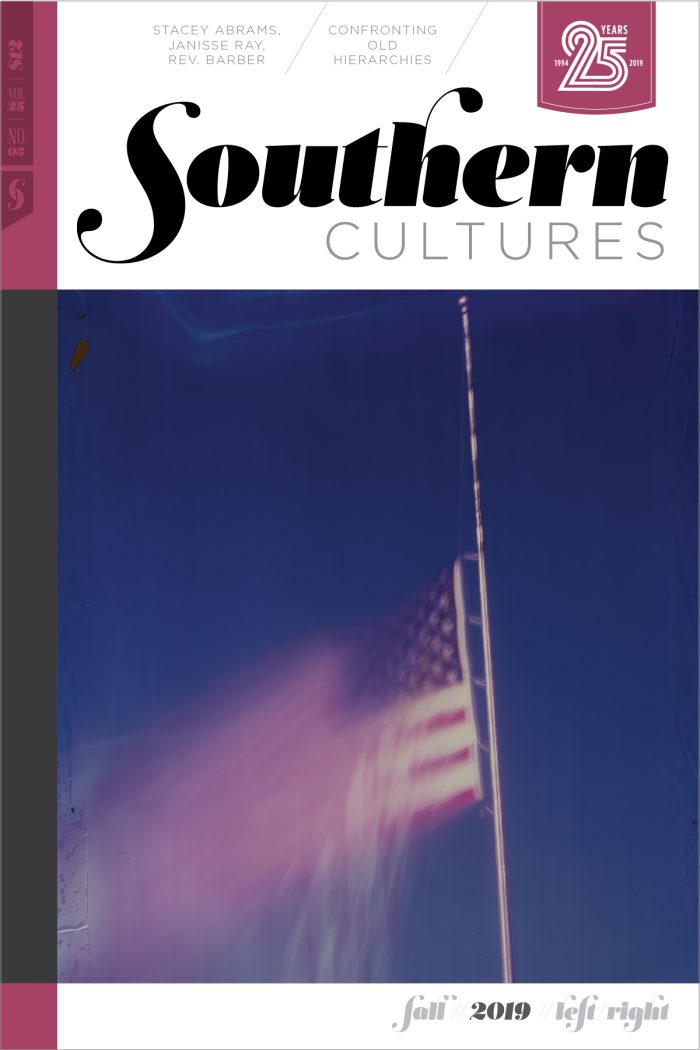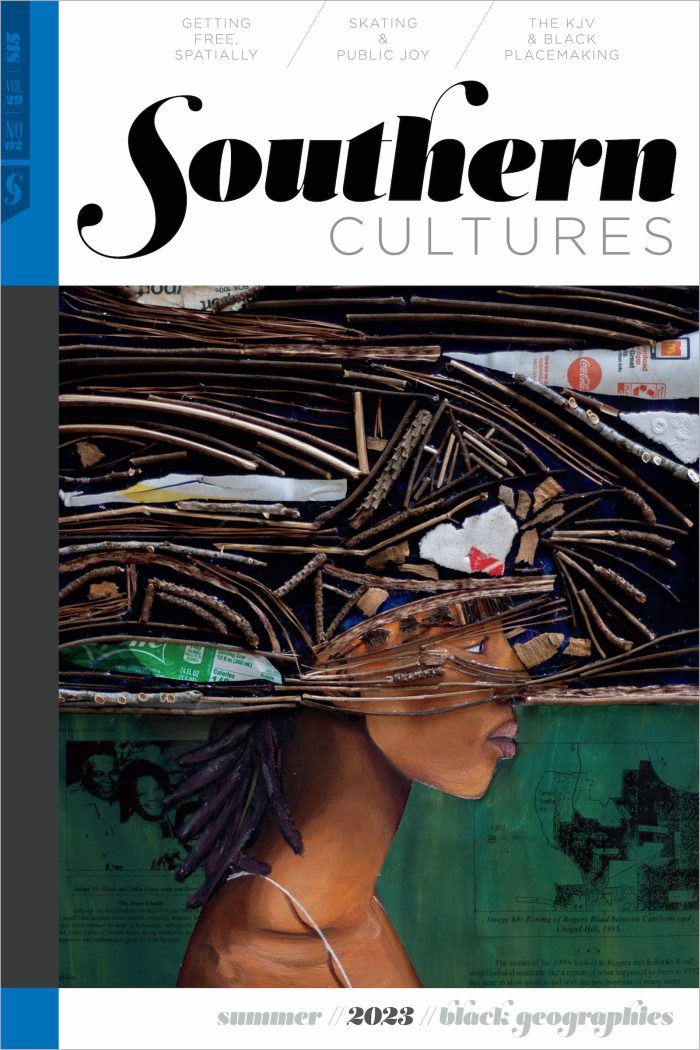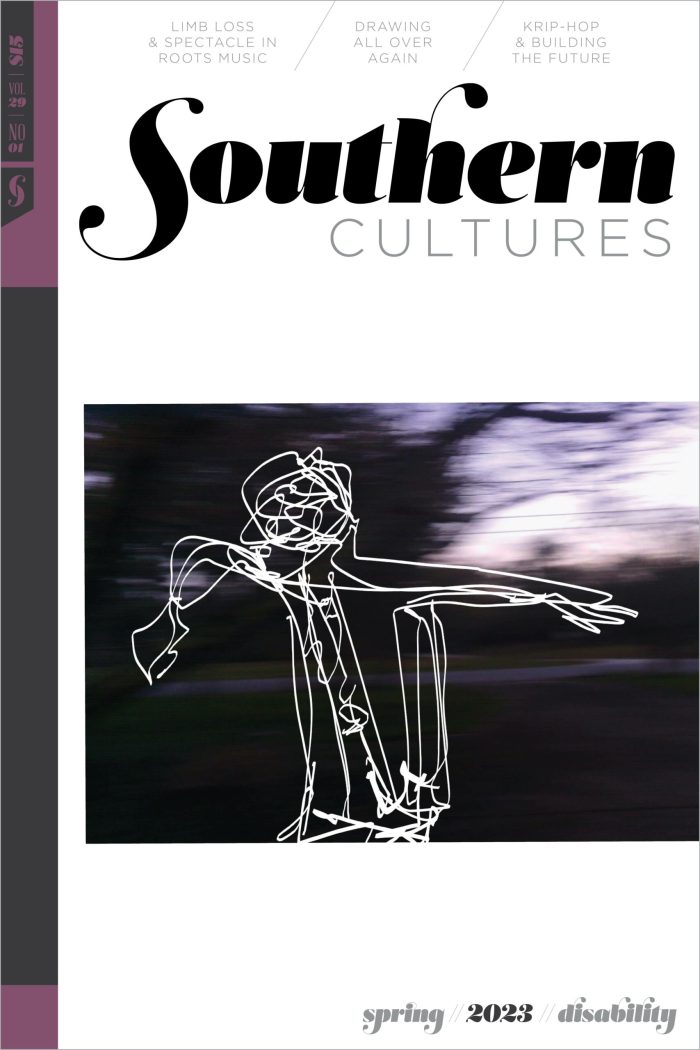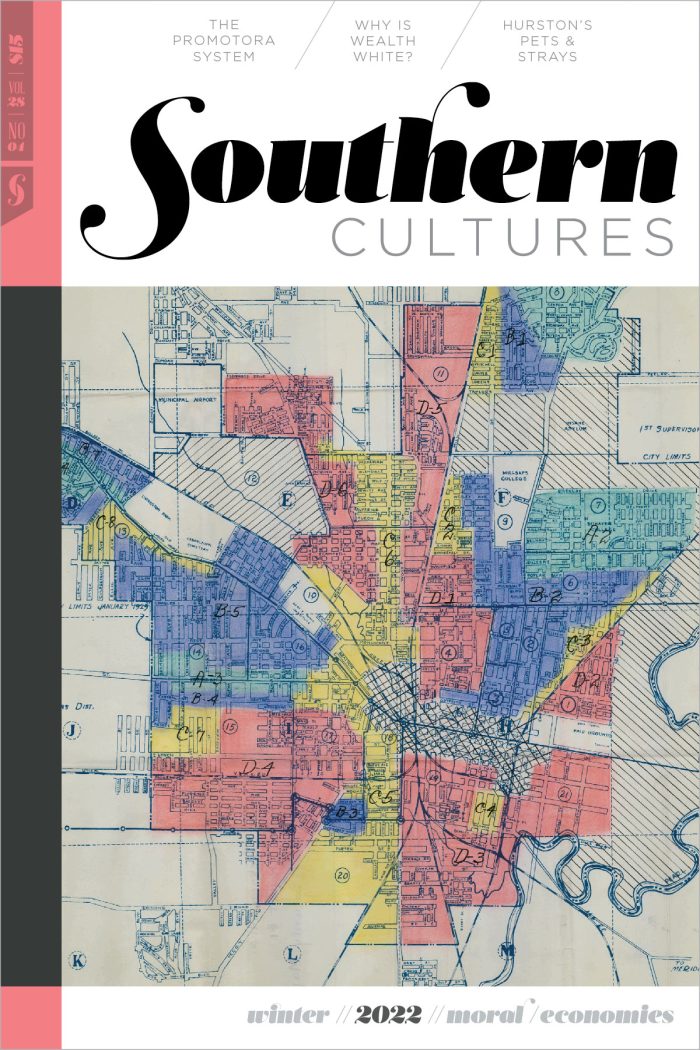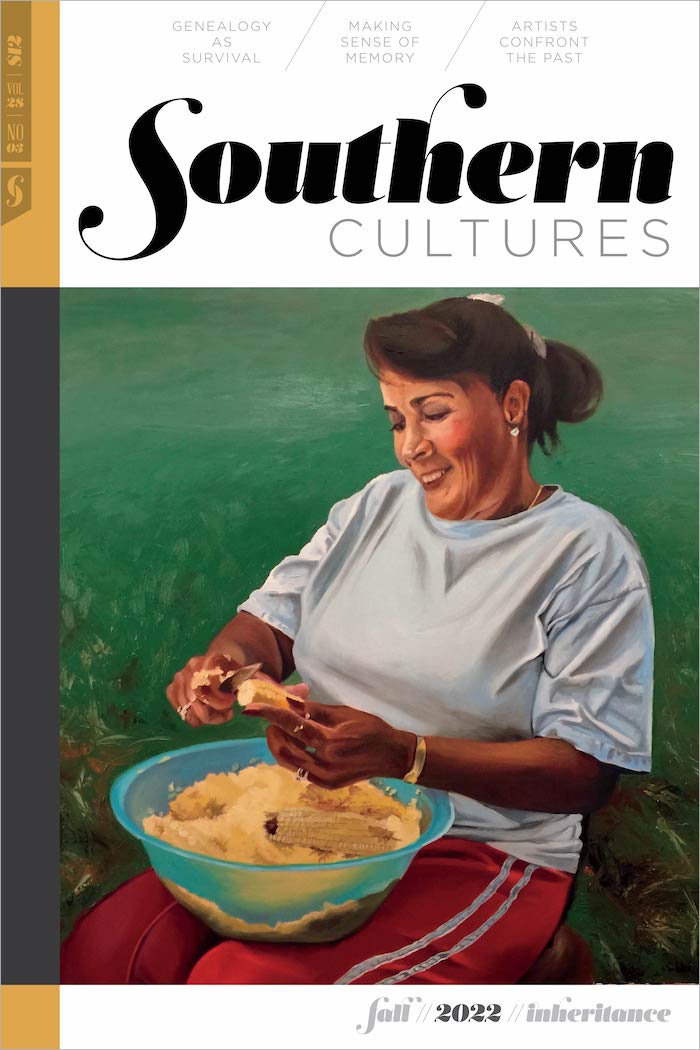Essay
BUY ACCESS
by Harry Watson
“The South has seen its share of revolutions before.” Welcome to Left/Right, the third of four special issues to mark the twenty-fifth year of Southern Cultures. Backward/Forward and Inside/Outside are now behind us; Here/Away will cap the series. This time, our good friend Joseph Crespino, distinguished historian at Emory University, has come forward as our »
Essay
BUY ACCESS
by Joseph Crespino
“Right field, where perennial All-Star Hank Aaron played, was, first, the site of the Sermon on the Mount and, later, Golgotha.” For twenty-five years, Southern Cultures has been the premier forum for interdisciplinary, public-facing scholarship on the American South. I’m honored to serve as a guest editor for one of the four twenty-fifth anniversary issues, »
Interview
by Rev. Dr. William J. Barber II,
Tim Tyson
REV. DR. WILLIAM J. BARBER II: My father . . . said, “When you feel overwhelmed by your moment, go back and read the moments that people faced that are worse than yours. What courage and hope and truth did they find in that moment?” I go back and I read Henry McNeal Turner and »
Interview
Carving A Path For Those Who Will Follow
by Stacey Abrams,
Valerie Boyd
VALERIE BOYD: Everybody I’ve talked with, when I’ve told them that I’m interviewing Stacey Abrams, they’re so excited—and especially Black women. Every time I tell a Black woman I’m interviewing you, they get a dreamy look in their eyes that’s usually reserved for Michelle Obama. Well, maybe Oprah. But now there are three Black women »
Essay
by Angela Hudson
Native people and topics appear infrequently in much conventional southern history—even that which takes race and ethnicity as its primary lens. When they do appear, they often do so spectrally, are set apart from other subjects, and are presumed to have played only minor roles in the development of the field’s big-ticket topics: slavery, the »
Memoir
BUY ACCESS
by Alison Collis Greene
“Though race is not present in biblical depictions of slavery, white southerners’ reading of scripture presupposed a natural social hierarchy in which Christianity, whiteness, and masculinity stood at the top.” The black smears of paint on my face and hands were smelly, and they itched. It was the mid-1980s, and I was seven, maybe, or »
Interview
by Janisse Ray,
Amy Wright
AMY WRIGHT: Do you consider yourself a radical, meaning that you favor drastic political, economic, or social reform? JANISSE RAY: There’s no denying that I am a radical and that I favor far-reaching and extreme reform on many levels. We are at a place globally that requires drastic action. We need immediate action to mitigate »
Memoir
Crucial Conversations for Contemporary Kids of Color in the New South
by Sonny Kelly
The Talk is a one-person performance that draws on the voices of ancestors, elders, youths, and intellectuals to engage in the difficult conversations that we must have with our children as we prepare them to survive and thrive in a divided America. In this original, seventy-five-minute performance, I evoke over twenty characters who draw audiences »
Interview
BUY ACCESS
Rosa Ortez-Cruz, interviewed by Lori Fernald Khamala
by Rosa Ortez-Cruz,
Lori Fernald Khamala
“At first, I thought three months was forever. I counted ninety-six days; “Oh God, that’s insane!” But imagine, now, I’ve already been here for more than four hundred days.” I have been living in this church for more than a year now, and it hasn’t been easy at all. It is exhausting, for me and »
Inteview
BUY ACCESS
Jan Rader in conversation with Elaine McMillion Sheldon
by Jan Rader,
Elaine McMillion Sheldon
“Open your eyes, talk to us. We’ll tell you what we did wrong. We’ll tell you what we did right.” Jan Rader: There’s probably not a day goes by that somebody doesn’t come up to me and tell me a story. They come up and they say, “Thank you.” But what they really want is »
Photo Essay
by Joe Shay
In the short story “Knowing He Was Not My Kind Yet I Followed,” Barry Hannah describes a gay Confederate soldier’s infatuation with Jeb Stuart, under whom he serves. It’s a hopeless and doomed predicament. To my mind, it’s a kind of peculiar faith in an unachievable outcome—much like the faith in political solutions to the »
Photo Essay
BUY ACCESS
Chokwe Antar Lumumba in conversation with Kiese Laymon
by Chokwe Antar Lumumba,
Kiese Laymon
“We have to figure out how we go around [the mountain] or, like Hannibal, how we just run the troops up.” Kiese Laymon: Yo, man. It’s so good to talk to you, fam. I don’t even know how to ask somebody as busy as you how you doing. Are you less busy in the summer, »
Interview
by Holly Christopher Lewis,
Ocean Eerie
This interview first appeared in the Left/Right Issue (vol. 25, no. 3: Fall 2019). I’m not sure I’d be who I am today if I hadn’t come to Atlanta in 2011. I was born in Boston, went to Harvard and lived in Cambridge. I grew up on the south side of Boston, a Catholic town, »
Essay
by Diane Roberts
Mark Twain hated Sir Walter Scott. He blamed Scott for the Civil War, accusing him of infecting the South with the “Sir Walter disease,” brought on by the “sham grandeurs, sham gauds, and sham chivalries of a brainless and worthless long-vanished society.” Before the war and beyond the South’s defeat into the heyday of the »
Memoir
BUY ACCESS
Confronting Old Hierarchies in the New South
by Emily Ruth Rutter
“Unsurprisingly, there was no conversation around my dinner table as a child about the racist politics and actions of the Kitchin brothers.” Let me lay all of my cards on the table: my ancestors were not just bystanders but prominent figures in the ironfisted white supremacist tyranny over the black citizens of Halifax County, North »
Poetry
BUY ACCESS
by Jonathan Farmer
1. On Your Deathbed The flame still arced inside your brain, a severing announcement of you to you— whatever part remained. It was the first news you missed, and as the state assembled in a room that wasn’t yours you groaned. Your mind withdrew. You lived all night, all flesh, inflamed, your voice a vent. Too long to fit the borrowed bed you limbs hung off at odd »
Memoir
A meditation through time
by Skylar Gudasz
1. When I was five and my brother Jason was three, we lived in an old white farmhouse near the James River in Varina, Virginia. I was too young to believe in the idea of ghosts; otherwise, I’m sure I would have been convinced I was seeing them in every dusk-dim corner of the property—by »
